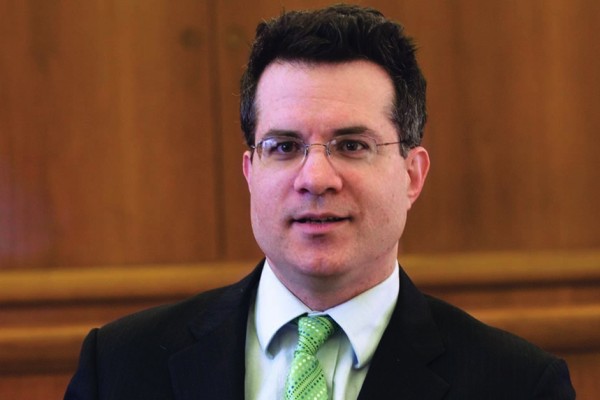WashU Expert: Campus activists doing more good than harm for free speech
The wave of recent student protests on college campuses has revived a long-standing debate about the tension between free speech and policies of diversity and inclusion. That tension is vastly overstated, said free speech expert Greg Magarian.
Three challenges for the First Amendment
A group of some of the country’s top scholars in First
Amendment law recently gathered at Washington University in St. Louis to discuss pressing challenges
being faced by the first of our Bill of Rights. Three issues rose to the
top of the list for Washington University’s first amendment experts:
free expression in a digital age; impaired political debate; and
weakened rights of groups.
Religious holiday displays – three wise men and a heap of legal troubles
The upcoming holiday season brings with it the
annual gaze upon religious displays — and the legal issues that come
with them. “The Supreme Court’s approach to public religious displays
under the Establishment Clause has been less than clear,” says John
Inazu, JD, expert on religion and the constitution and professor of law
at Washington University in St. Louis.“Some commentators have
described it as the ‘three plastic animals rule’ –a Christian nativity
scene on public property passes muster if it is accompanied by a
sufficient combination of Rudolph, Frosty, and their friends.” Inazu
says that future litigation will likely press against this
line-drawing, but even apparent victories for religious liberty may come
at a significant cost.
New book clarifies free speech problems of sign laws
Signs, billboards, and placards are such a familiar
part of the landscape that we often don’t notice them. However, even the
humblest “on premise” sign is protected by the highest law of the land,
the U.S. Constitution’s free speech clause. Daniel R. Mandelker,
the Howard A. Stamper Professor of Law at Washington University in St.
Louis, has set out to help local governments and municipalities
appreciate that fact with his new book, Free Speech Law for On Premises Signs. Published online at ussc.org and landuselaw.wustl.edu, the book will be released in hard copy later this year by the United States Sign Council.
Legal fight over royal vacation photos highlights difference between European and American views of privacy and free speech
Britain’s royal family has obtained an injunction against the French magazine Closer to prevent it from publishing topless photographs of the Duchess of
Cambridge, Kate Middleton. “The case would likely come out differently if
it were brought in the United States,” says Neil Richards, JD,
professor of law at Washington University in St. Louis. Richards, an internationally recognized expert in privacy and free speech law who hails from England, explains that English and European courts have been very aggressive in stopping media
from publishing pictures delving into the sex lives of celebrities.
Privacy law expert warns of the perils of social reading
The Internet and social media have opened up new vistas for people to share preferences in films, books and music. Services such as Spotify and the Washington Post Social Reader already integrate reading and listening into social networks, providing what Facebook CEO Mark Zuckerberg calls “frictionless sharing.” “But there’s a problem. A world of automatic, always-on disclosure should give us pause,” says Neil M. Richards, JD, privacy law expert and professor of law at Washington University in St. Louis.
SOPA, PROTECT IP will stifle creativity and diminish free speech, say WUSTL experts
Wikipedia and other sites plan to go dark to protest the Stop Online Piracy Act (SOPA) and the PROTECT IP Act under consideration in Congress. Three law professors from Washington University in St. Louis, Kevin Collins, Gregory Magarian and Neil Richards, signed a letter to Congress in opposition to the PROTECT IP Act. Read Magarian and Richards’ current comments on SOPA and PROTECT IP.
‘Occupy’ protests a First Amendment balancing act
The Occupy protests present a classic First Amendment problem: balancing political dissent against government control of property. “In theory, the government has very limited authority to curb expressive activity in what the law calls ‘public forums,’” says Gregory P. Magarian, JD, constitutional law expert and professor at Washington University in St. Louis School of Law.
Snyder v. Phelps: Victory for free speech with a note of concern
The Supreme Court’s decision March 2 that a military funeral protest by Fred Phelps’ Westboro Baptist Church is protected by the First Amendment is a free speech victory, but “there is one note of concern for free speech advocates, which is the opinion’s toleration of ‘free speech zone’ theory,” says Neil Richards, JD, constitutional law expert and professor of law at Washington University in St. Louis. “The opinion notes with approval that the funeral protest took place from a free speech zone from behind a protective fence, and notes at the end that even though Phelps’ speech was protected, it would certainly be amenable to possibly aggressive time, place, and manner restriction,” says Richards, a former law clerk for former Chief Justice William H. Rehnquist.
Development of First Amendment law under Rehnquist’s Court to be discussed at Nov. 18 conference; MCLE credit available
First Amendment and public law scholars from around the country will come together during “The Rehnquist Court and the First Amendment” conference from 8:30 a.m. to 5 p.m. on Nov. 18 in Anheuser-Busch Hall, Room 309. The conference, sponsored by the Washington University Journal of Law and Policy, will examine the development of First Amendment law over the past two decades under Chief Justice William H. Rehnquist.
View More Stories

